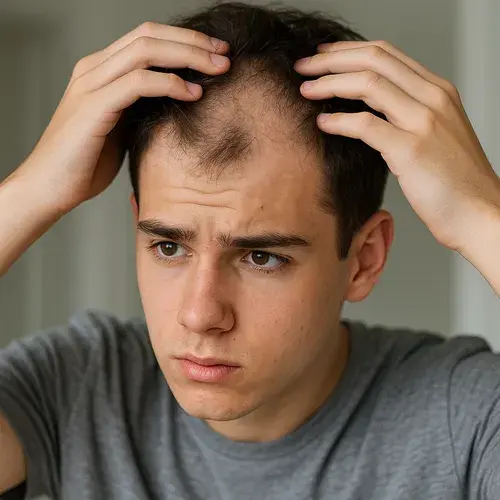Teenage Hair Loss: Causes and Solutions. Addressing hair loss in younger patients
Teenage hair loss, caused by hormones, nutrition, stress, and styling, impacts self-esteem. Learn key causes and practical solutions to manage and promote

Hair loss in teenagers is a common issue that can significantly impact their self-esteem and overall well-being. Understanding the causes and finding effective solutions is crucial for addressing this sensitive topic. In this article, we will delve into the various reasons behind teenage hair loss and explore practical steps to help manage and treat it. Causes of Teenage Hair Loss Teenage hair loss can stem from a multitude of factors, each with its own set of underlying causes. Here are some of the most common reasons: Hormonal Changes During puberty, hormone levels undergo significant changes. These fluctuations can lead to hair thinning and loss in both boys and girls. Conditions like polycystic ovary syndrome (PCOS) and thyroid problems can further exacerbate hormonal imbalances, contributing to hair loss. Nutritional Deficiencies A diet lacking essential vitamins and minerals is another significant contributor to hair loss in teenagers. Nutrients like biotin, iron, zinc, and vitamin A play a crucial role in maintaining healthy hair. Inadequate intake of these nutrients can result in dull, thinning hair and even hair loss. Stress and Mental Health High levels of stress, anxiety, and depression can lead to a condition called telogen effluvium. This condition causes hair to shift from the growing phase to the resting phase, eventually leading to excessive hair fall. Hairstyling and Treatments Excessive heat styling, tight hairstyles, and frequent use of chemical-laden hair products can weaken hair and lead to breakage and loss. Teenagers often experiment with their hair using chemical-based treatments like bleaching, perming, and coloring, which can damage the hair cuticles and lead to shedding. Medical Conditions Autoimmune diseases like alopecia areata and scalp infections such as ringworm can also cause hair loss in teenagers. These conditions should be diagnosed by a healthcare professional to determine the best course of treatment. Solutions for Teenage Hair Loss Addressing teenage hair loss requires a multi-faceted approach that includes dietary changes, scalp care, stress management, and lifestyle adjustments. Here are some effective solutions: Balanced Diet Encourage teenagers to adopt a balanced diet rich in proteins, vitamins, and minerals. Foods such as fish (rich in omega-3 fatty acids), eggs (rich in biotin), spinach (rich in iron), and sweet potatoes (rich in vitamin A) contribute to healthy hair growth and reduce hair fall. Scalp Care Proper scalp care is essential for maintaining healthy hair. Regularly washing the scalp with a gentle shampoo can help remove dirt and oils that may clog pores. Avoid using harsh chemicals or excessive heat styling tools that can damage the scalp. Stress Management High levels of stress can exacerbate hair loss. Encourage teenagers to engage in stress-reducing activities such as yoga, meditation, or deep breathing exercises. Reducing stress can help manage conditions like telogen effluvium. Gentle Styling Avoid excessive heat styling and tight hairstyles that can weaken hair. Opt for gentle styling techniques and use heat protectants when using heat tools to minimize damage. Additional Hair Care Products Using additional hair care products such as minoxidil or platelet-rich plasma (PRP) treatments can help stimulate hair growth and reduce hair loss. Consult a dermatologist before starting any new treatments. Lifestyle Changes Making lifestyle changes such as reducing the consumption of processed foods, cutting back on refined sugar, and increasing physical activity can also help promote healthy hair growth. Regular exercise improves blood circulation, which is essential for delivering nutrients to the scalp. In conclusion, teenage hair loss is a complex issue that requires a comprehensive approach. By understanding the causes and implementing practical solutions, teenagers can manage their hair loss effectively. It is crucial for parents and healthcare professionals to address this issue sensitively and provide support to help young patients regain their confidence and maintain healthy hair.
Need Professional Consultation?
Our professional doctors will provide detailed hair and scalp analysis and develop personalized treatment plans.
Book Consultation Now